Search the Special Collections and Archives Portal
Search Results

Transcript of interview with Owen Earl Cox by Mark Milford, March 6, 1981
Date
Archival Collection
Description
On March 6, 1981, Mark Milford interviewed Owen Earl Cox (born 1909 in Bunkerville, Nevada) about his experiences growing up in and working in Nevada. Cox first talks about his early moves to and from Nevada and his work in road construction in the 1930s. He then discusses his work of machinery at the Basic Magnesium Plant and some of his experiences during that time. Cox also talks about his family, the Mormon Church, the growth of population, and the increase in tourism. He later describes managing a store he owned known as Vegas Village and the types and prices of the products that were sold there. The end of the interview involves a discussion of crime, Cox’s hobby of cattle ranching, and his views on the growth of Las Vegas.
Text

Transcript of interview with Helen Early by Dale Forshee, February 26 & 27, 1979
Date
Archival Collection
Description
On February 26 and 27, 1979, Dale Forshee interviewed Helen Early (born 1919 in Des Moines, Iowa) about her life in Southern Nevada. Early first talks about her arrival to Las Vegas and the early development of the city. She also talks about some of the first businesses in Las Vegas, the initial development of the University of Nevada, Las Vegas, and the early nightclubs and casinos in the city. Early also discusses her work in establishing a school for disabled children before discussing other topics related to McCarran Airport, Bugsy Siegel, Senator Walter Baring, the first churches in Las Vegas, and the Helldorado Parade.
Text

Transcript of interview with Irwin Kishner by Claytee D. White, September 10, 2013
Date
Archival Collection
Description
Irwin Kishner (1933 ? 2017) was a noted real estate developer, attorney and longtime community leader. In this oral history interview conducted in 2013, he briefly shares his childhood growing up Jewish in Brighton Beach area of Brooklyn, New York. He often speaks of himself in the third person, as he brings to life his roots, his family?s move to Miami where he graduated from high school and the tale of his relocation to Las Vegas to work with his uncles Herman and Maury Kishner. He describes his entrance to Las Vegas as that of a bon vivant. And truly, Irwin, fell in love with the city from the moment he arrived in 1960. Irwin was a graduate of University of Florida (1954) and University of Miami Law School (1958). Both his daughters, Sharon and Joanna, were born in Las Vegas and he reminisces about becoming a Jewish bachelor father to them. In June 2013, shortly before this interview, Irwin celebrated his 80th birthday. He was a proud father, grandfather and energetic businessman who left an indelible mark on everyone he knew. As a developer, he was known for the Somerset Apartments, Somerset House Motel, Somerset Gardens apartment complex, and the Somerset Shopping Center. He enjoyed reflecting on the many community organizations he dedicated himself to, from the Las Vegas Convention and Visitors Authority to Opportunity Village to the original Las Vegas Rotary Club to the Community Concert Association?and that?s just to mention a few.
Text
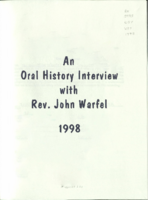
Transcript of interview with John Warfel by Dennis McBride, March 11, 1988
Date
Archival Collection
Description
This is Dennis McBride, today is Wednesday, March 11,1998 and I'm talking with John Warfel at Christ Church Episcopal who 's going to be leaving Las Vegas permanently March 16, so I'm very grateful that he made some time for me today. We're going to be talking about Christ Church, about Dignity and their experience here, and about Mr. Warfel himself.
Text

Transcript of interview with Marie Horseley by Suzanne Becker, June 13, 2007
Date
Archival Collection
Description
Twenty years after her birth in Utah in 1924, Marie Horseley met and married her husband who was an engineer for the Union Pacific Railroad. They settled in Las Vegas, his home town and soon purchased a home for $9800 in the new John S. Park neighborhood. Sixty years later Marie, twice a widow, remains in the home. Up the street four doors, one of her granddaughters lives with her three children. Marie recalls the new housing development that appealed to railroad workers. The roads were dirt and there were no streetlights, but soon a community blossomed. Marie is a self-described quiet resident; her life was about raising her three daughters and being a member of the LDS church. However, she knew everyone on her street no matter their religious affiliation. Today the businesses are gone. Homes have changed appearances over the years as owners have changed. Ethnic diversity is apparent and the sense of community closeness has slipped away for her. Yet she loves her place there, feels safe and secure. When asked about the ides of John S. Park being designated a historic district, she is not all that wowed by the idea of restrictions that might be included in that. Nevertheless, she has no intention of relocating from the comfort of the place she has called home all these years.
Text

Transcript of interview with Roger Thomas by Stefani Evans and Claytee D. White, August 31, 2016
Date
Archival Collection
Description
As he reveals in this oral history, Roger Thomas is, among many other things, a son, a father, a brother, a husband, a student, an artist, a visionary, and a philanthropist. As the second son of Peggy and E. Parry Thomas’s five children, Roger was raised a Mormon child of privilege and civic responsibility. The banking family summered in Newport Beach, wintered in Sun Valley, and taught their children by words and deeds that it is not up for debate if you will be involved in your community; the only question is how you will apply your talents and resources to benefit your community. Roger absorbed the lessons well. As a child who struggled in school but excelled in art, he attended his last two years of high school at Interlochen Arts Academy, graduating in 1969, finally finding himself “in an environment where what I did had currency.” From there he earned his BFA from the School of the Museum of Fine Arts Boston and Studio Degree from Tufts University before returning to Las Vegas and eventually joining Steve Wynn’s team in 1981. As Executive Vice President of Design for Wynn Design & Development, he is the man in whom Steve Wynn places his trust to make real at each Wynn property the Wynn design philosophy: aim for a constituency of highly sophisticated, well-traveled, very educated people and give them a reality, a now, that is so fetching, so alluring they wish to be no place else. As he was mentored by his father and Steve Wynn, he too is mentoring those who will follow him. At Wynn, the next generation will carry forward the Wynn idea of evoca-texture, of creating “moments of experiential emotion that result in a memory so captivating and so unique that if you want to repeat that you have to come back.” At home, he collaborates with his daughter on a children’s book that has the potential to become a series; she is the illustrator, while he provides the words. Roger Thomas sat for this interview five days after his father, E. Parry Thomas, passed away in Idaho. Instead of postponing the interview to a more convenient time, Roger kept the appointment and explained, “This is for UNLV. If I’d cancelled my father would have killed me.”
Text
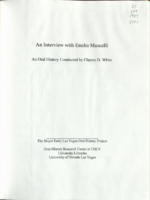
Transcript of interview with Emilio Muscelli by Claytee D. White, November 25, 2008
Date
Archival Collection
Description
Emilio Muscelli was in his mid-80s when he sat for this oral history interview. With a thick Italian accent he recalled his career as a Las Vegas maitre d' that spanned decades of Strip history. Emilio arrived in America in 1948, landed a job at the Copacabana in New York City. His boss was Jack Entratter, who brought Emilio to Las Vegas when he opened the Sands in 1952. Over the decades he has witnessed the ups and downs of Las Vegas economy and has befriended many celebrities along the way. He reminisces during this interview about his friendship with singer Bobby Darin, actor Cary Grant and meeting a laundry list of others. He fondly speaks of those he worked for and their contribution to the growth of Las Vegas.
Text
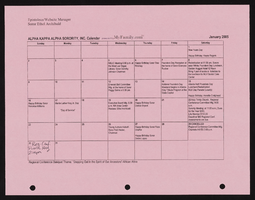
Alpha Kappa Alpha Sorority, Theta Theta Omega Chapter calendar
Date
Archival Collection
Description
From the Alpha Kappa Alpha Sorority, Incorporated, Theta Theta Omega Chapter Records (MS-01014) -- Chapter records file.
Text
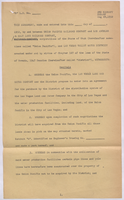
Contract between the Union Pacific and Los Angeles & Salt Lake Railroad Companies, and the Las Vegas Valley Water District, August 29, 1952
Date
Archival Collection
Description
Second redraft of contract for the Las Vegas Valley Water District to remove all power lines and water pipelines from railroad property after a yet to be agreed upon number of months.
Text
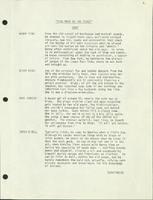
Script for television pilot, This Must Be the Place by Hank Henry and Bill Willard, 1950s
Date
Archival Collection
Description
The preface and script for a sitcom television show conceived of by Hank Henry and Bill Willard "to evoke the spirit of fun and laughs springing out of conflict and understanding between the old comedy school and the new school."
Text
